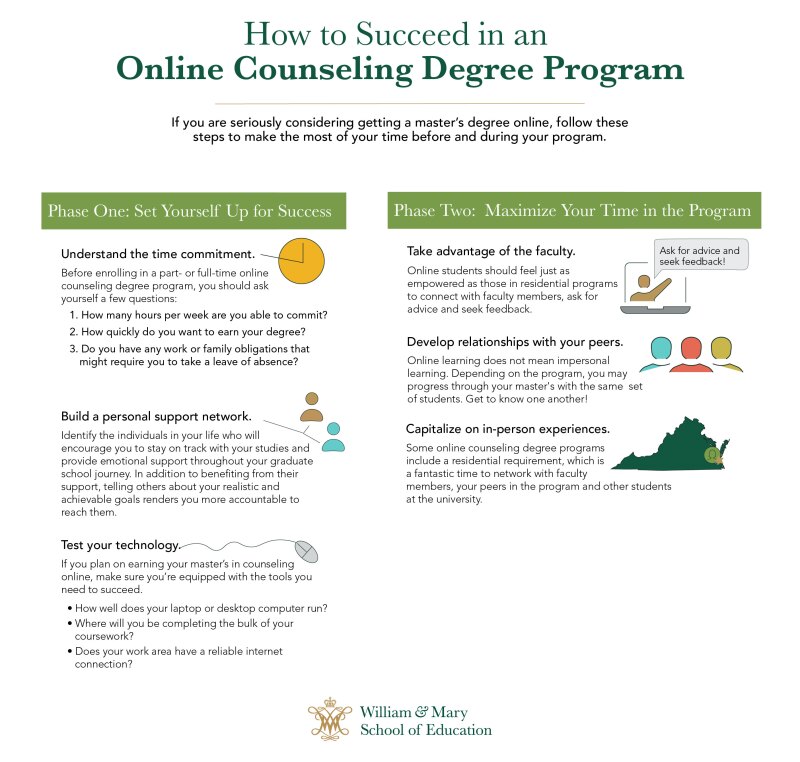Succeeding in an online counseling program means you'll most likely be earning a CACREP-accredited master’s degree. If you are a working professional or an individual who requires a certain amount of flexibility in your graduate coursework, an online counseling degree can help you pursue your passion without putting your life on hold.
If you are seriously considering getting a master’s degree online, follow these steps to make the most of your time before and during your program.
Phase One: Set Yourself Up for Success
Understand the time commitment.
Before enrolling in a part- or full-time online counseling degree program, you should ask yourself a few questions: How many hours per week are you able to commit? How quickly do you want to earn your degree? Do you have any work or family obligations that might require you to take a leave of absence?
For a part-time program designed for working professionals such as William & Mary’s Online Master of Education (M.Ed.) in Counseling, students can expect to spend 15 to 20 hours on coursework, and they can complete the program in as few as three years. Once you fully grasp the time commitment required on a weekly and monthly basis, you can start developing a schedule that accounts for lectures, research, coursework and, eventually, fieldwork.
Build a personal support network.
Don’t be shy about sharing your academic and professional goals with friends and family members. You may find you know someone who has gone through a similar situation balancing work, school and personal life. If that’s the case, ask for their honest opinion on how they prioritized their time and what sacrifices they made.
Identify the individuals in your life who will encourage you to stay on track with your studies and provide emotional support throughout your graduate school journey. In addition to benefiting from their support, telling others about your realistic and achievable goals renders you more accountable to reach them.
Test your technology.
If you plan on earning your master’s in counseling online, make sure you’re equipped with the tools you need to succeed. How well does your laptop or desktop computer run? Where will you be completing the bulk of your coursework? Does your work area have a reliable internet connection?
Technology issues can truly throw a monkey wrench in a perfectly planned schedule, so take time upfront to ensure you have what you need.
Phase Two: Maximize Your Time in the Program
Take full advantage of the faculty.
Engaged faculty members can dramatically impact students’ overall experience in any graduate program, which is especially true for those pursuing a master’s in counseling online. Online students should feel just as empowered as those in residential programs to connect with faculty members, ask for advice and seek feedback.
The small class sizes in the Online M.Ed. in Counseling at William & Mary allow for a great deal of mentorship and coaching opportunities. Students also are encouraged to communicate frequently with their assigned faculty advisor, who can provide guidance about topics ranging from transfer credits to internship locations to paths to pursue after graduation.
In addition, dynamic online learning environments provide one-of-a-kind engagement opportunities. For instance, through a Social Justice dashboard, students in the Online M.Ed. in Counseling can track their progress toward prescribed competencies and solicit feedback from faculty members as well as mentors outside the program.
Develop relationships with your peers.
Online learning does not mean impersonal learning. Depending on the program, you may progress through your master’s in counseling online with the same set of students, and it behooves you to get to know your fellow classmates and their backgrounds as well as you can. Hearing from students with different backgrounds, theoretical approaches and work experiences can broaden your perspective, which is especially beneficial in a hands-on field such as counseling.
At William & Mary, online counseling students progress through the program as a cohort and take all courses together in their respective concentrations, Clinical Mental Health Counseling or School Counseling. Students also have the benefit of meeting up face-to-face during the residency weekends, which brings us to the next tip...
Capitalize on in-person experiences.
Some online counseling degree programs include a residential requirement, which is a fantastic time to network with faculty members, your peers in the program and other students at the university.
The Online M.Ed. in Counseling requires students to attend two onsite residency weekends. In addition to providing an opportunity for students to meet face-to-face with their cohort members, on-ground students, local agencies and faculty, the residency weekends help students prepare for the practicum and internship portions of the program.
The best online counseling degree programs prepare you just as well as any residential program to enter the field as a responsive, ethical and culturally competent counselor. With a social-justice-focused curriculum, William & Mary’s Online M.Ed. in Counseling provides aspiring clinical mental health and school counselors with the tools they need to guide others through life’s challenges. Read more about the online student experience at William & Mary.


